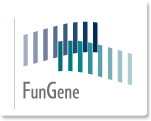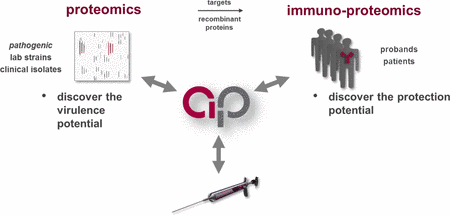Junior Research Group Applied Proteomics
Greifswald University has long experience in functional proteome analysis. New insights into the protein inventory of microorganisms as well as its modifications could be gained due to our scientists considerable expertise. Proteome analysis as core topic of functional genome analysis is a dynamically growing interdisciplinary industrial sector. Its application requires complex analytical procedures which mostly demand high technical expanse. This complexity generally complicates a broad survey of proteomes. Thus, several scientific research groups are not able to perform suchlike studies. For this reason, many institutions form competence centers for analytic research whose expertise is on disposal for many different users. One of these centers is the 2004 founded Center for Innovation Competence (ZIK-FunGene) that is now in its second continuance. Its formation was promoted by amply founding of the BMBF.
The junior research group "Applied Proteomics" of the ZIK FunGene lead by Dr Dipl. Ing. Frank Schmidt started on April, 1st in 2011. The group is integrated in the department of Functional Genomics lead by Professor Dr Uwe Völker. Its scientific project concerns infection-related in vivo topics. Major aim of the new junior research group is to further develop proteome-specific high resolution methods by means of cell culture and mouse models. Thus, obtained results regarding interactions between pathogenic bacteria and their host cells will be placed into modern clinical diagnostics for identification of potential biomarkers of diagnostic and prognostic value.
In the future the "Applied Proteomics" junior research group's focus will cover three basic fields of research:
Expansion of methods for characterization of disease relevant proteins in host-pathogen-interactions using e.g. GWA-analyses beside cell culture and mouse models and their bioinformatic evaluation.
Establishment of adequate tools and processes for screening of body fluids in epidemiologic analyses e.g. high resolution LC-MS, MRM, and protein multiplexing.
Application of the new tools in epidemiologic projects with focus on the biology of infectious diseases.
Greifswald already disposes of an excellent proteome and transciptome facility which the present research project will use to full extend. This analytical potential will be further advanced in cooperation with specific partners to efficiently establish different procedures for analytics in proteomics. One of these methods will be high resolution MRM measurement where the technological development and transfer is guaranteed by cooperation with ETH-Zurich. Signal transduction and posttranslational modification is the topic of another recently within the ZIK FunGene founded junior research group "Pathoproteomics" lead by Dr Falko Hochgräfe.
Furthermore we plan to establish the currently underrepresented protein multiplexing technology for analyzing sera. To the existing excellent collaboration with the group of Professor Dr Barbara Bröker of EMAU Greifswald the Research Center Borstel will be added as another partner on immunological questions. Here the pathogenic agent Staphylococcus aureus is used as a model for improvement of the above mentioned basic techniques. All thus obtained essential skills from in vivo proteome experiments will be tested for their possible clinical relevance.





